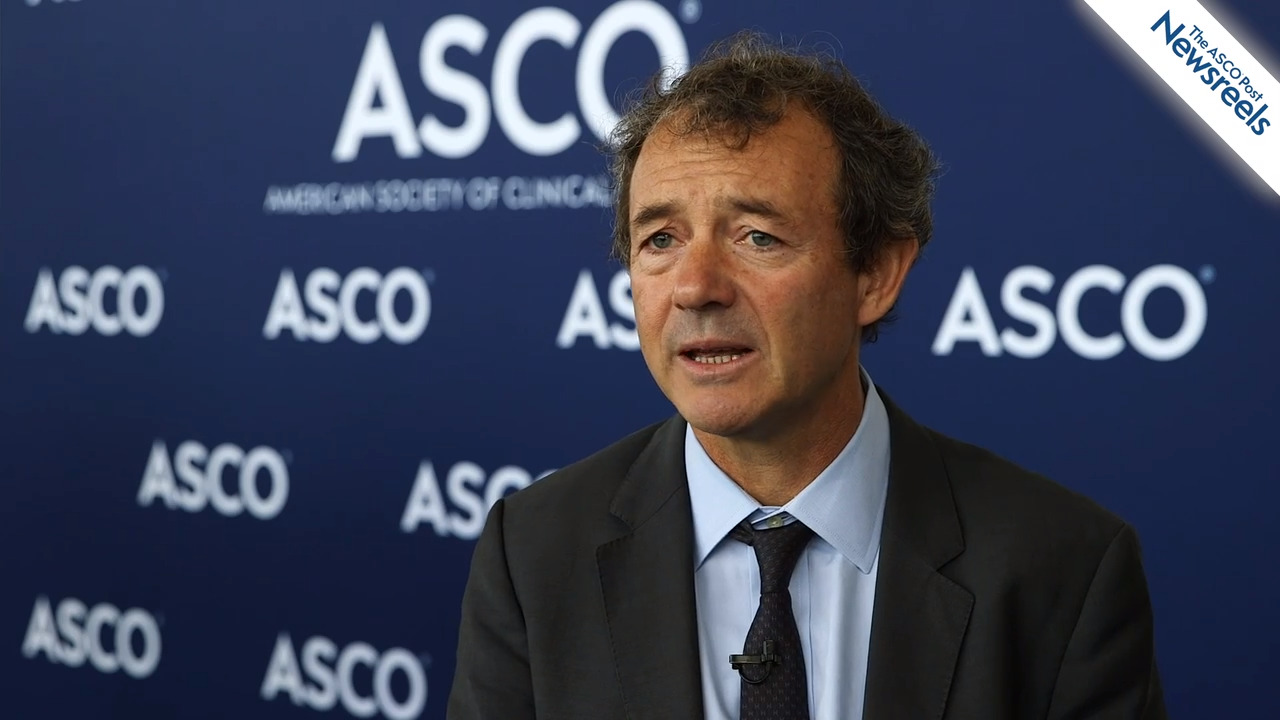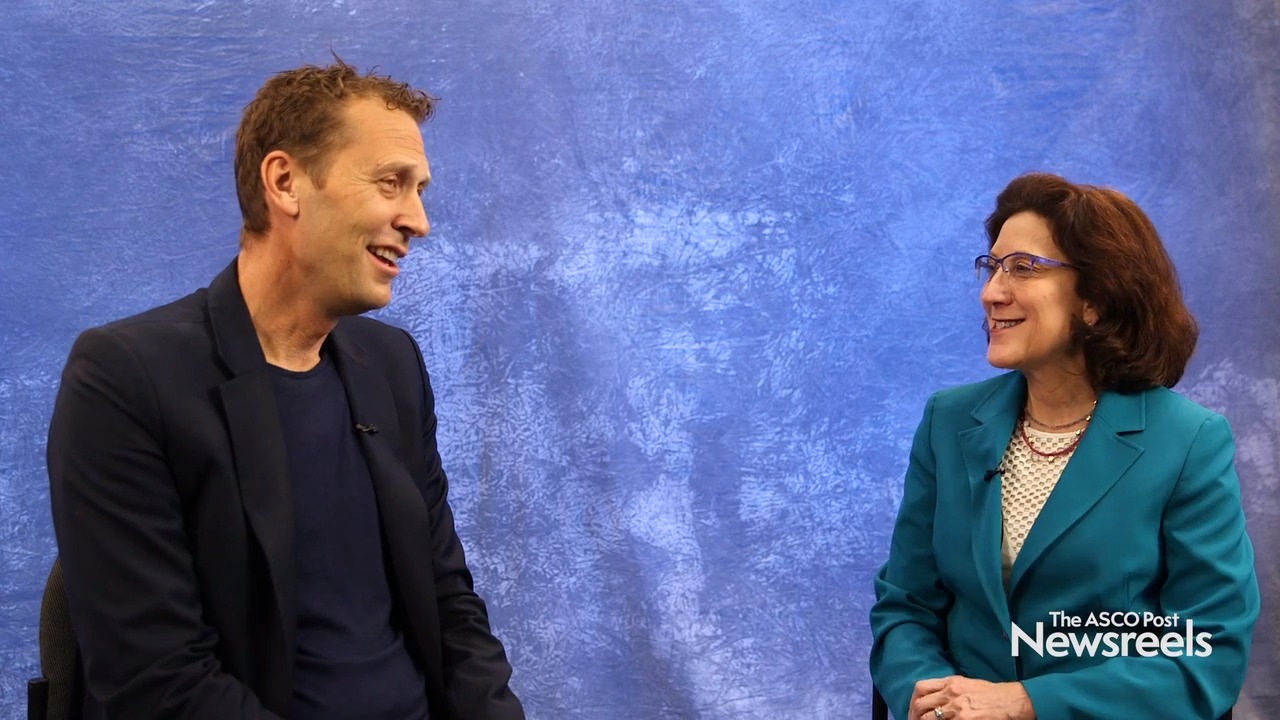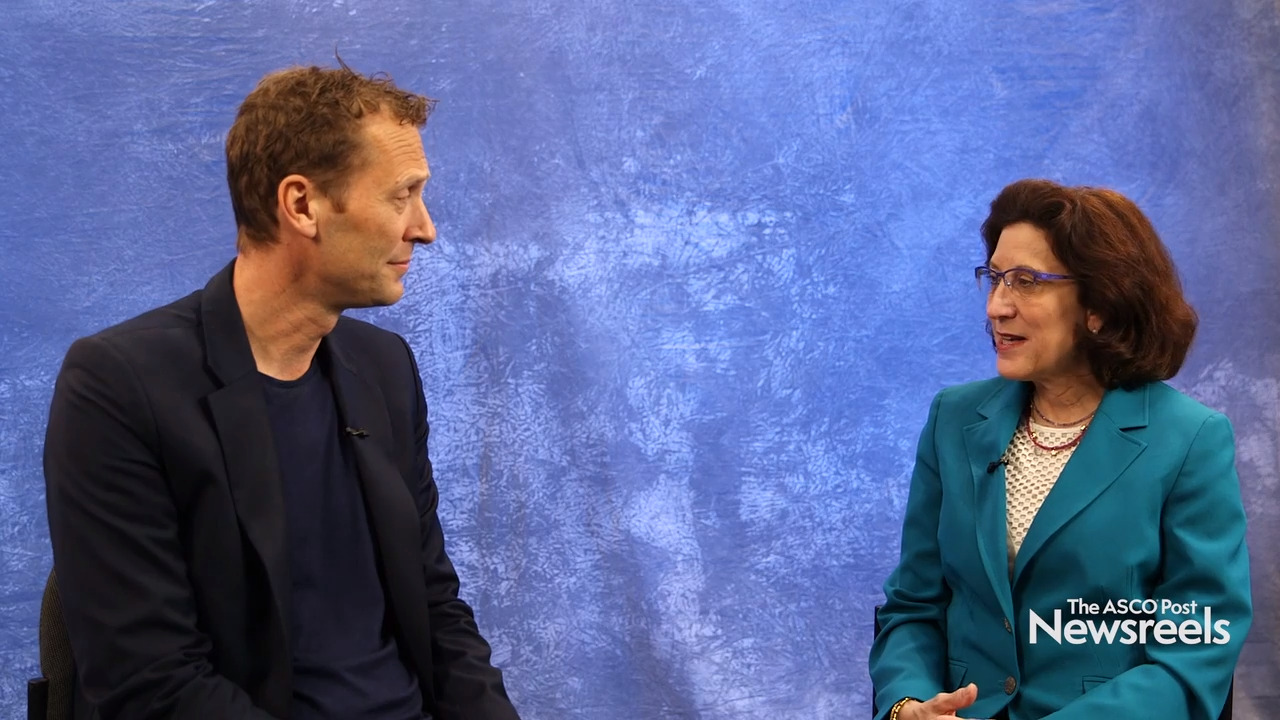2019 ASCO Annual Meeting
Poster to Bedside: Geriatric Oncology Research Updates From 2019 ASCO Annual Meeting
Functional status impairment, limited mobility, comorbidities, polypharmacy, and other aging-related manifestations are common in older individuals. These conditions complicate the oncologic manageme...
Update on Treatments Under Study for Chronic Lymphocytic Leukemia
The ASCO Post has offered comprehensive coverage of the 2019 ASCO Annual Meeting. To complement this news coverage, here are featured clinical trials of several treatments in chronic lymphocytic leuke...
CATNON Trial Shows Concurrent Temozolomide May Offer Benefit in IDH-Mutant Anaplastic Glioma
Concurrent temozolomide treatment during radiotherapy did not increase overall survival in patients with anaplastic gliomas without 1p/19q co-deletion, according to data from the second interim and fi...
Expert Point of View: Thomas Paul Slavin, Jr, MD
Thomas Paul Slavin, Jr, MD, of City of Hope National Medical Center, where he is Assistant Clinical Professor in the Department of Medical Oncology, Division of Clinical Cancer Genomics, and a Progra...
Exploratory Analysis Shows DNA Methylation Assay Highly Specific for Cancer Detection
A cell-free DNA test based on the presence of DNA methylation has proven highly specific as a multicancer detection test and appears especially good at detecting high-risk malignancies. In most cases,...
Treatment Update on Selected Non-Hodgkin Lymphomas
As part of The ASCO Post’s coverage of the 2019 ASCO Annual Meeting, featured here are four abstracts from different clinical trials evaluating newer treatments for Waldenström’s macroglobulinemia a...
Notable Presentations at ASCO 2019 Included Studies in Sarcoma, Lymphoma, Myeloma, and Breast and Kidney Cancers
The 2019 ASCO Annual Meeting featured a wealth of presentations on important topics. In addition to our regular news coverage of the meeting, we present below some highlights of other studies that add...
Expert Point of View: Sarina Anne Piha-Paul, MD, and Benjamin Besse, MD, PhD
THE INVITED discussants of the presentations on repotrectinib and AMG 510 were enthusiastic about these agents. Sarina Anne Piha-Paul, MD, of The University of Texas MD Anderson Cancer Center, discuss...
Brief Update on Clinical Trials of New Treatments in Gastrointestinal Cancers
The 2019 ASCO Annual Meeting provided attendees with an abundance of clinically relevant abstracts in gastrointestinal cancers. Briefly featured here are clinical trial updates on pembrolizumab in the...
Two Investigational Agents Demonstrate Safety, Efficacy in Lung Cancer
A handful of investigational drugs in early-phase trials always create a buzz at ASCO Annual Meetings. Two that garnered attention this year, and could eventually change outcomes in the clinic, are th...
Update on Newer Treatments in Non-Hodgkin Lymphomas
As part of The ASCO Post’s coverage of the 2019 ASCO Annual Meeting, featured here are summaries of five abstracts of different clinical trials evaluating newer treatments for follicular and marginal ...
Study Highlights on Novel Agents and Supportive Care Strategies in Prostate Cancer
In addition to our regular coverage of major news stories from the 2019 ASCO Annual Meeting, here is an additional roundup of important studies related to prostate cancer. ARAMIS: Darolutamide and Qua...
Expert Point of View: Mark Pegram, MD, and Sandra Swain, MD, FASCO
Mark Pegram, MD, the Susy Yuan-Huey Hung Professor of Medical Oncology and Director of the Stanford Breast Oncology Program, said the Dana-Farber study “independently confirms that HER2 heterogeneity...
Is Heterogeneity Within HER2-Positive Tumors Clinically Relevant?
Breast cancers that display heterogeneity of HER2 expression may represent a distinct subset of HER2-positive breast cancer that is associated with lower rates of pathologic complete response, accordi...
Two Pivotal Studies in Breast Cancer Report Further Analyses
At the 2019 ASCO Annual Meeting, two pivotal breast cancer trials reported final or additional analyses: one confirmed the negative results seen in earlier reports,1 and the other supported a new surv...
Expert Point of View: Vernon K. Sondak, MD
Commenting for The ASCO Post, melanoma expert Vernon K. Sondak, MD, Chair of the Department of Cutaneous Oncology at Moffitt Cancer Center, Tampa, maintained that the association between immunothera...
Study Finds Immune-Related Adverse Events Herald Benefit With Adjuvant Pembrolizumab in Melanoma
In the EORTC 1325/KEYNOTE-054 trial of adjuvant pembrolizumab in patients with stage III melanoma, recurrences were reduced by 44% in the immunotherapy arm, vs placebo, but this benefit increased to a...
APACT Trial: Nab-paclitaxel/Gemcitabine vs Gemcitabine Alone in Adjuvant Treatment of Pancreatic Cancer
The largest adjuvant trial in pancreatic adenocarcinoma, the global phase III APACT trial, evaluated the combination of adjuvant nab-paclitaxel/gemcitabine vs gemcitabine monotherapy in patients with ...
SOPHIA Trial Tests Margetuximab in Heavily Pretreated Patients With HER2-Positive Metastatic Breast Cancer
In the phase III SOPHIA trial of 536 heavily pretreated patients with HER2-positive metastatic breast cancer, the novel anti-HER2 antibody margetuximab plus chemotherapy led to significant improvement...
Enfortumab Vedotin After Checkpoint Inhibition in Metastatic Urothelial Cancer
A phase II study found that treatment with the antibody-drug conjugate enfortumab vedotin achieved responses in 44% of patients with locally advanced or metastatic urothelial cancer previously treated...
Study Shows Benefit With Pazopanib in Treatment of Carcinoid Tumors
Pazopanib significantly improved progression-free survival by 47% in patients with progressive carcinoid tumors, in a prospective randomized phase II trial presented at the 2019 ASCO Annual Meeting.1 ...
Study Supports Neoadjuvant Chemotherapy in Operable Colon Cancer
For patients with operable colon cancer, neoadjuvant chemotherapy resulted in numerous benefits in the FOxTROT trial but did not reach target significance for the primary endpoint. The study was pres...
Targeting FOLFOXIRI Plus Bevacizumab to a Metastatic Colorectal Cancer Subset
In a population of patients with metastatic colorectal cancer deemed to be at high risk by the presence of circulating tumor cells (CTCs), first-line treatment with FOLFOXIRI plus bevacizumab improved...
IDEA Collaboration Turns to Duration of Adjuvant Treatment in Stage II Colon Cancer
The findings of the landmark IDEA trial in stage III colorectal cancer, presented at the 2017 ASCO Annual Meeting and subsequently published in The New England Journal of Medicine,1 were upheld by a s...
Advances in Targeted Therapy for Non–Small Cell Lung Cancer
Targeted therapies for non–small cell lung cancer (NSCLC) are a hotbed of investigation. Two new targeted therapies are promising for patients with lung tumors that are either EGFR exon 20 insertions ...
Neoadjuvant Immunotherapy May Benefit Patients With Early-Stage NSCLC
Neoadjuvant immunotherapy had encouraging activity and demonstrated favorable safety in patients with resectable early-stage non–small cell lung cancer (NSCLC), according to two studies presented at t...
NALA Trial: Neratinib Plus Capecitabine Shows Benefit in Metastatic Breast Cancer
In the global phase III NALA trial, treatment of metastatic HER2-positive breast cancer with neratinib plus capecitabine significantly improved progression-free survival, delayed the time to intervent...
Clinical Risk Enhances Utility of TAILORx Findings in Young Women With Breast Cancer
Clinical risk factors add prognostic information that complements the 21-gene recurrence score, according to a new analysis from the landmark TAILORx trial.1,2 The integration of clinical risk with th...
Project Facilitate: FDA’s Plan to Ease Expanded Access to Novel Therapies
The U.S. Food and Drug Administration (FDA) plans to provide oncologists with greater help in acquiring expanded access to investigational therapies. Deemed Project Facilitate, the pilot program was a...
CLEOPATRA End-of-Study Analysis in Metastatic Breast Cancer: 37% Alive at 8 Years
The end-of-study analysis of the landmark CLEOPATRA trial shows that 37% of patients with HER2-positive metastatic breast cancer are still alive at 8 years, according to principal investigator Sandra ...
Expert Point of View: Vanita Noronha, MD
The KEYNOTE-048 trial is practice-changing, according to its invited discussant, Vanita Noronha, MD, Professor of Oncology at Tata Memorial Centre in Mumbai, India. Although a number of questions rema...
Improved Survival Shown With First-Line Pembrolizumab in Advanced Head and Neck Cancer
In the final analysis of KEYNOTE-048, first-line pembrolizumab monotherapy led to a significant improvement in overall survival, vs standard chemotherapy with targeted therapy (EXTREME regimen), in pa...
Two Studies Question the Role of Continuous LHRH Antagonists in Metastatic Castration‑Resistant Prostate Cancer
In the field of prostate cancer, the use of androgen-deprivation therapy (ADT) in men with metastatic castration-resistant prostate cancer is received wisdom. When experts are asked why ADT is continu...
Fixed-Duration Venetoclax Plus Obinutuzumab as First-Line Treatment in Older Patients With CLL Who Have Comorbidities
A fixed-duration regimen of venetoclax plus obinutuzumab demonstrated superior progression-free survival, complete response rates, and minimal residual disease (MRD) negativity compared with chlorambu...
Expert Point of View: Charles Drake, MD, PhD
IN A SEPARATE interview with The ASCO Post, Charles Drake, MD, PhD, commented on the clinical implications of the ENZAMET and TITAN trials, as well as studies of apalutamide, abiraterone acetate, and ...
Apalutamide Improves Survival Outcomes in Castration-Sensitive Metastatic Prostate Cancer in TITAN Trial
Adding apalutamide to androgen-deprivation therapy (ADT) significantly improved survival in men with metastatic castration-sensitive (also termed hormone-sensitive) prostate cancer, according to the r...
Expert Point of View: Ian Chau, MD
IAN CHAU, MD, a consultant medical oncologist at the Gastrointestinal and Lymphoma Units of The Royal Marsden NHS Foundation Trust in London and Surrey, United Kingdom, was the invited discussant of K...
KEYNOTE-062: Pembrolizumab Is a New First-Line Option in Gastric/Gastroesophageal Junction Cancer
KEYNOTE-062, a study of first-line treatment in patients with advanced gastric or gastroesophageal junction adenocarcinoma, found pembrolizumab to be noninferior to chemotherapy and perhaps better tha...
Expert Point of View: Wells Messersmith, MD, and Allyson Ocean, MD
“THE RATIONALE for the POLO study is sound,” said invited study discussant Wells Messersmith, MD. “There’s clearly an unmet need in pancreatic cancer, and there are promising data for poly (ADP-ribose...
POLO Trial Shows Maintenance Olaparib Improves Progression-Free Survival in Metastatic Pancreatic Cancer
In patients with metastatic pancreatic cancer and germline mutations in BRCA1 or BRCA2, maintenance therapy with olaparib doubled the time to disease progression and the proportion of patients who wer...
Chemotherapy and/or Hormonal Agents: Differing Perspectives
WHEN ASKED which treatment to start with—docetaxel or enzalutamide, Dr. Sweeney said, “Patients fit for chemotherapy with high-volume disease can receive chemotherapy [docetaxel] and come back to thes...
ENZAMET Trial Shows Enzalutamide Improves Overall Survival in Hormone-Sensitive Metastatic Prostate Cancer
Agents that improve survival in metastatic castration-resistant prostate cancer when added to background androgen-deprivation therapy (ADT) are showing success in treating metastatic prostate cancer e...
2019 ASCO: 3-Year Outcomes in the KRISTINE Trial on Neoadjuvant Trastuzumab Emtansine Plus Pertuzumab in HER2-Positive Breast Cancer
As reported at the 2019 ASCO Annual Meeting (Abstract 500) and in the Journal of Clinical Oncology by Hurvitz et al, 3-year outcomes in the phase III KRISTINE trial showed that neoadjuvant trastuzumab...
François-Xavier Mahon, MD, PhD, on Chronic-Phase Chronic Myeloid Leukemia: Treatment-Free Remission After Second-Line Treatment
François-Xavier Mahon, MD, PhD, of the Université Bordeaux and Institut Bergonie, discusses results of the ENESTop study, which demonstrated the long-term durability and safety of treatment-free remis...
Peter Schmid, MD, PhD, and Hope S. Rugo, MD, on Breast Cancer: Next Steps in Immunotherapy
Hope S. Rugo, MD, of the University of California, San Francisco, and Peter Schmid, MD, PhD, of Barts Cancer Institute, Queen Mary University of London, discuss ongoing trials of immunotherapy for ear...
2019 ASCO: Paclitaxel/Carboplatin vs Paclitaxel/Ifosfamide in Carcinosarcoma of the Uterus or Ovary
Results from the phase III NRG Oncology clinical trial GOG 0261 comparing paclitaxel plus carboplatin to paclitaxel plus ifosfamide in women with stage I–IV recurrent carcinosarcoma of the uteru...
2019 ASCO: OPTiM Study on T-VEC for Unresectable Melanoma
New research on the immunotherapy talimogene laherparepvec (T-VEC)—an injectable oncolytic virus—for patients with unresectable melanoma was presented by Milhem et al at the 2019 ASCO Annu...
2019 ASCO: Long-Term Survival With Dabrafenib Plus Trametinib in Metastatic BRAF-Mutated Melanoma
In an extended analysis of the COMBI-d and COMBI-v trials reported at the 2019 ASCO Annual Meeting (Abstract 9507) and in The New England Journal of Medicine, Robert et al found a 5-year overall survi...
2019 ASCO: New TAILORx Data Provide Treatment Guidance for Women Under 50 With Early Breast Cancer
New information about adjuvant therapy to prevent recurrence of breast cancer in women 50 years of age or younger has emerged from the Trial Assigning Individualized Options for Treatment (Rx), or TAI...
Peter Schmid, MD, PhD, and Hope S. Rugo, MD, on Metastatic Triple-Negative Breast Cancer: Atezolizumab Plus Nab-paclitaxel
Hope S. Rugo, MD, of the University of California, San Francisco, and Peter Schmid, MD, PhD, of Barts Cancer Institute, Queen Mary University of London, discuss an update of the IMpassion130 interim o...



